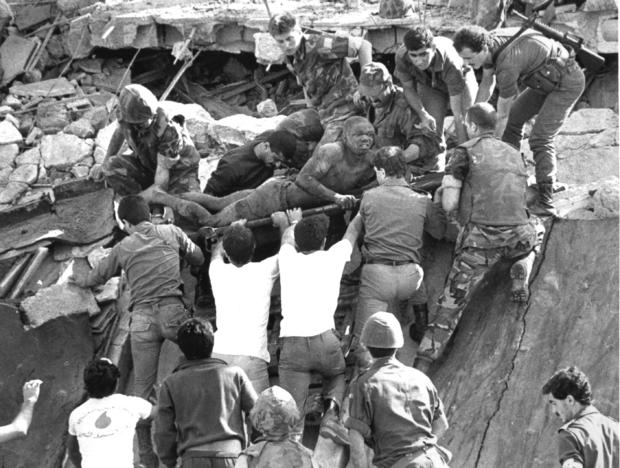Top Marine, survivors remember 1983 Beirut blast
JACKSONVILLE, North Carolina The Marine Corps' top general said Wednesday the deadly Beirut barracks bombing 30 years ago helped define the start of America's war against terrorists.
Marine Corps Commandant Gen. James Amos, survivors and friends gathered at a memorial bordering Camp Lejeune that honors the victims of the bombing Oct. 23, 1983. Before Sept. 11, it was the deadliest terrorist attack on Americans.
Many of the 241 Americans killed were members of Camp Lejeune's 24th Marine Amphibious Unit. Soldiers and sailors were also among the dead. A terrorist attack the same day against French peacekeepers in Lebanon's capital city killed 58.
At left, watch Charles Kuralt anchor the CBS News Special Report on the bombing of the U.S. Marine barracks in Beirut on October 23, 1983.
In the barracks attack, a suicide bomber drove a truck full of explosives into the military barracks. That attack and one on the U.S. Embassy in Beirut six months earlier that killed 52 signaled the start of a new kind of war, Amos said.
"The nation was not expecting this. There was a new kind of warfare - the threat of radical extremists being able to target military and civilian personnel with weapons of mass destruction for political, religious and personal gains. It was a new way to attack the West," Amos told hundreds of people. "We will never forgive nor will we ever forget."
American, French, British and Italian troops had been deployed to Lebanon to try stabilizing the country bloodied by a civil war between Christians allied with Israel and Muslims.
President Ronald Reagan ordered the battleship USS New Jersey, stationed off the Lebanese coast, to bombard the hills near Beirut in retaliation. Months later, the Marines were ordered out of Lebanon.
A U.S. investigation found the barracks bombing occurred because of lax security.
The bombing was blamed on the Lebanese Shiite militia Hezbollah, which is backed by Iran. A U.S. judge has ordered Iran to pay more than $7 billion to the families of victims, who continue trying to collect from Iranian assets in the United States frozen or hidden for decades.
Dale Garner was asleep in his bunk when the barracks building "went from a four-story building to a 25-foot (7.6-meter) pile of rubble." Of the 15 men in the room, he was the sole survivor. Garner was medically retired from the Marines a year after the blast.
"Was it worth it?" said the 51-year-old. "No. A lot of men lost that day. A lot of good friends, a lot of brothers."
As he looks at the recent wars in Afghanistan and Iraq, he doubts there can be peaceful coexistence "with someone who theoretically hates you."
"We may go in peace," Garner said. "We're not accepted in peace. They don't like us."
